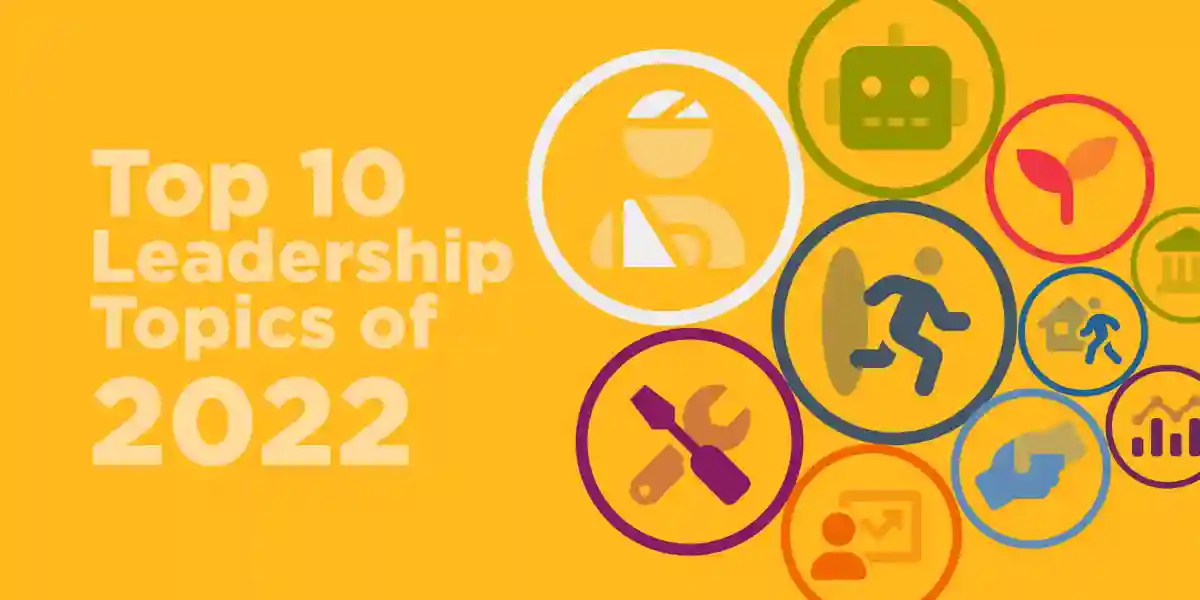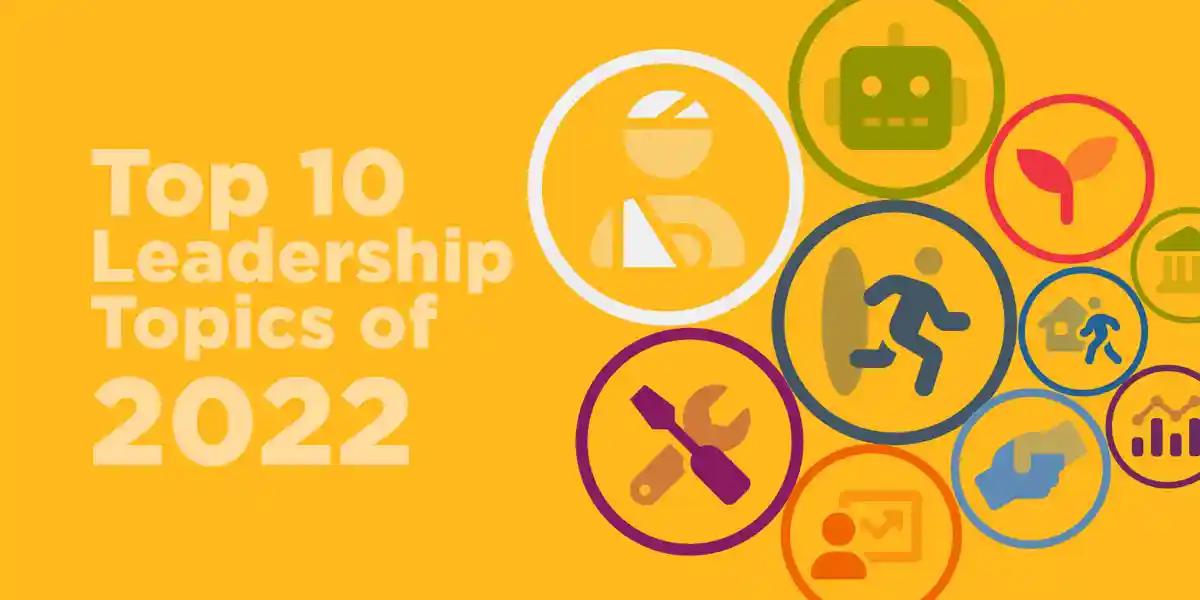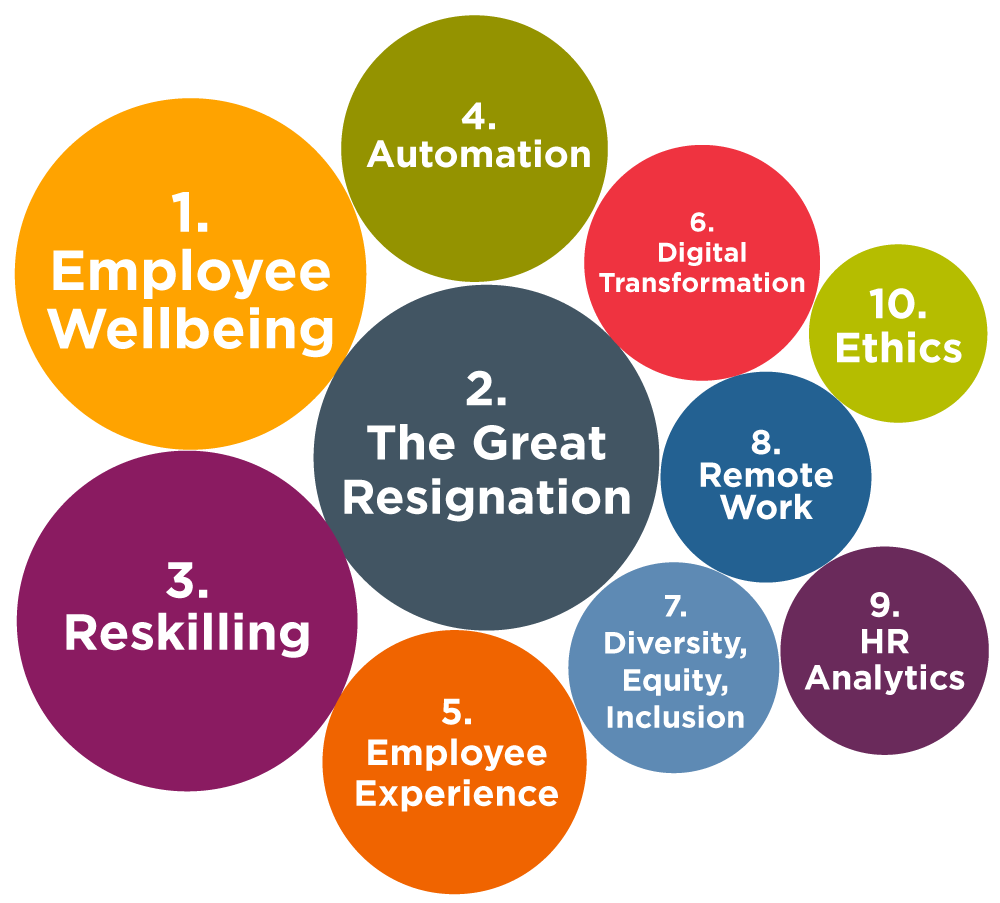
What are the hot leadership topics and trends emerging as we begin 2022? And how will these trends shape the future of work? There are clear signs that the turbulent changes of this past year have redefined the workplace. As a result, what’s required of leaders and companies to be successful has changed dramatically.
Each year for the past seven years, we’ve identified trending leadership topics by examining the content shared by 20 top influencers on Twitter. Based on this year’s analysis, hot leadership topics for 2022 are emerging due to the combined impact of high turnover and increasing uncertainty in how markets and economies will endure the continued challenges presented by the pandemic.
Topping the hot leadership topics list for 2022 are these 10 topics, in order of the most mentions across social influencers and posts:

1. Employee wellbeing soars as #1 priority
One silver lining of the pandemic is that businesses were forced to confront the necessities of safeguarding the health of their workforce and communities. As a result, wellbeing continues to be a top business priority. There can’t be productivity if people aren’t well, but this has also certainly extended to families.
Companies are now better supporting their employees and offering improved family benefits. This focus on wellbeing has also increased leaders’ awareness that they and their teams need time and support to take care of themselves and loved ones. Leaders’ concern and support for employee wellbeing will continue to be crucial in the coming year, especially as a top driver of retention.

2. The Great Resignation makes a culture change
With a record 4.5 million departures at the end of 2021, it’s clear that the Great Resignation isn’t slowing down anytime soon. However, growing economic uncertainties will lead more people to seek out stability at work. And as a result, employees will want to work for companies that have an essential quality: trust.
So, having a culture, and leaders, that people can trust is fast becoming a differentiator. And this is especially true given that trust in leadership and societal institutions is at an all-time low. Consequently, trust is something more companies are designing for as part of their leadership development programs.
Above all, leaders will continue to be central in building trust and securing employee loyalty for the foreseeable future.
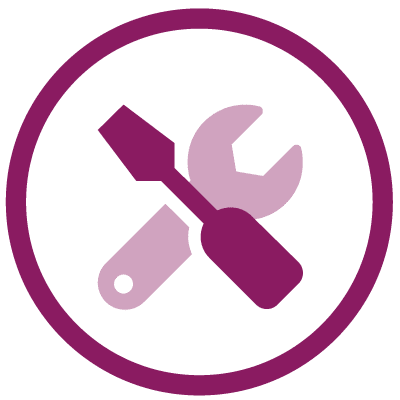
3. Dissolution of skill stability
Reskilling has been a simmering hot topic for the past several years, especially as it applies to professional and technical skills. But the past year and a half may go down as the great shake-up for leadership skills. Traditional leader skillsets including communication which could once be mastered, now need to be refreshed for different, and virtual, contexts. The shift to remote and hybrid work has also left little doubt whether leadership development can be one and done.
As a result, leaders will continually need to refresh and develop skills. That they are willing to put in the work is clear from the additional learning time sought out to confront the COVID-19 crisis. Companies can help in keeping skills sharp by moving beyond static job descriptions and skills architecture that carried on from years past. Critical capabilities can also be defined on a more ongoing basis by establishing processes to revisit, iterate, and refresh Success Profiles in line with strategic business priorities.

4. The robots are here to help Human Resources
Automation stepped up this past year in many industries and will be ever more critical to ease talent shortages. For instance, nowhere is this more evident than in interactive voice response (IVR) systems that have relieved overwhelmed customer service centers.
Given the challenges that HR departments face in recruiting replacements for historic turnover, robots and automated tools may very well come to the rescue. Automating HR processes can similarly drive new efficiencies and increase speed-to-hire while leaving the more interesting and creative work to humans. Companies will need to lean on leaders who can effectively communicate and manage the impact of automation in order to be successful with these advancements.

5. New tension points for employee experience
Employee experience surged onto our hot topics list two years ago and continues to rise in importance within the current war for talent. Both 2020 and 2021 were key learning years for employees. And this was especially true for young professionals who developed high expectations in terms of how and where they can work.
The huge increase in work flexibility and alternate modes of employment have contributed to the fluidity of the workforce and increasing pace of turnover. Designing for flexibility will continue to be a tension point in employee experience, but so will learning and growth opportunities.
Along with flexibility, there’s an increasing desire for skill and career development that companies cannot afford to ignore. As a result, leaders will also have to adapt how they approach development discussions and opportunities. It will be more important for top talent to not only feel valued but be aware of their growth potential for the future.

6. Technology sets a pace that needs to be people-centered
The past year wrapped up technology advancements that built on a surge in digital transformation, particularly in the retail and hospitality industries. This doesn’t mean a low-touch future. Ensuring people are comfortable working with new technologies as they are implemented is critical. For HR, people-centricity is a must with any technologies that are sought out to more effectively recruit and hire. This is also true for technologies HR uses for employee learning and development experiences.
In addition, fully embracing AI and digital advancements requires leaders who are capable of seeing the potential of new technologies. This also requires leaders who can help implement or develop new technologies to solve business problems for the future.

7. Talent shortages fuel gains for Diversity, Equity, and Inclusion (DEI)
Companies have made significant strides to ramp up their DEI programs over the past year, but that hasn’t solved the great attraction problem. Hiring and retention will be more challenging than ever in the coming year, and DEI leaders have unique experiences that can help.
Companies will benefit from exploring new sources and leaning on DEI leaders’ expertise at attracting harder to find candidates. And as talent continues to depart at extraordinary rates, diversity will be a differentiator in attracting more candidates. Similarly, demonstrating a commitment to diversity and fostering inclusion will help attract new candidates. It will also keep diverse talent from leaving.

8. Remote work exposes new and old biases
Although remote work could be a level-setter for companies, and reduce the impact of negative office politics, it’s also exposing other biases. Proximity bias, favoring those who work closest to you, has emerged as central in the discussion about the risks of poorly managed hybrid work teams.
If companies want to ensure a fair and inclusive workplace, leaders must consider how they can better evaluate performance and potential in a mixed environment. And objective data is certainly critical to mitigate the risk of bias and inform leaders’ judgments. For example, data gathered through high-quality assessments can help leaders and companies reduce this risk by focusing selection and advancement decisions on individuals’ capabilities and experiences rather than limited observations.
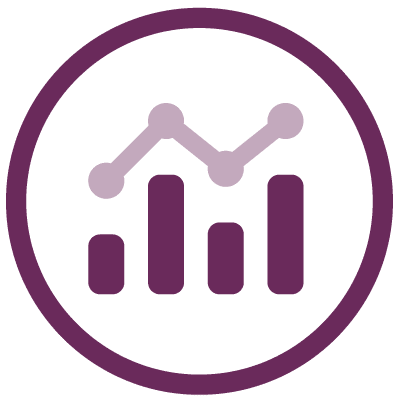
9. New frontier for HR analytics
A common theme throughout several hot leadership topics this year is the need for better data, and nowhere is this more critical to establish than for HR. The shift away from in-person and traditional work models has meant big gains and expectations for people data and analytics.
But the most successful programs will not eliminate people from decisions. They will provide leaders with the technology tools they need to integrate real-time data. And this will enable faster, more data-driven, and objective decisions. Ultimately, this push towards intelligent people data systems will help organizations maintain a more bias-free and up-to-date view of the talent they have to grow for the future.

10. Ethics reigns in the war for talent
This year started off with a tough reminder that ethics has an important, but easily overlooked, place in business. Elizabeth Holmes, founder of Theranos, was found guilty of criminal charges and defrauding investors. There are many other examples outside of Silicon Valley of the heavy cost once-trusted brands paid to overlook or ignore ethics.
This hits at a time when ethics and company values have become more important to applicants. In a recent study, 82% of professionals said they would rather be paid less and work for a company with ethical business practices than receive higher pay at a company with questionable ethics. In the current war for talent, a company’s reputation and leadership can be the difference in attracting the talent they need.
What Do Hot Leadership Topics for 2022 Mean for the Future of Work?
What do these trends mean for the future of work? No matter what the year ahead brings, it’s clear that companies and HR leaders will have to take a new approach to ensure they have effective and fair systems to hire and accelerate new talent. Leaders will continue to be central in building talent capabilities, making their role as coaches and models for growth more important than ever.
Above all, companies that continue to seek out and develop diverse capabilities for the future will be more likely to succeed in uncertain times, this year and beyond.
20 leadership and HR social influencers who posted content used in our topic analysis:
| Abhijit Bhaduri | @AbhijitBhaduri |
| Adam Grant | @AdamMGrant |
| Conor Neill | @conorneill |
| Dave Ulrich | @dave_ulrich |
| David Green | @david_green_uk |
| Ester Martinez | @Ester_Matters |
| Gordon Tredgold | @GordonTredgold |
| Jacob Morgan | @jacobm |
| Jean Case | @jeancase |
| Jeanne Meister | @jcmeister |
| Jim Stroud | @jimstroud |
| Johnny C. Taylor, Jr. | @JohnnyCTaylorJr |
| Lewis Garrad | @LewisGarrad |
| Meghan Biro | @meghanmbiro |
| Sharlyn Lauby | @sharlyn_lauby |
| Soumyasanto Sen | @soumyasanto |
| Stacy Donovan Zapar | @StacyZapar |
| Steve Boese | @SteveBoese |
| Susan LaMotte | @SusanLaMotte |
| Trish McFarlane | @TrishMcFarlane |
Explore DDI’s leadership development subscriptions.
Stephanie Neal is director of the Center for Analytics and Behavioral Research (CABER). She leads market and trend research focused on leadership and business innovation, and is general manager and lead author of DDI's Global Leadership Forecast.
Topics covered in this blog
